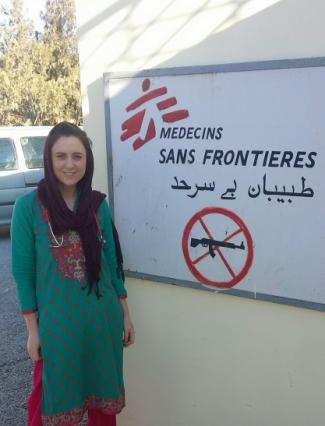03 June 2016 - Aisling Semple is working as a paediatrician in an MSF hospital in Pakistan.
The malnutrition wards are at full capacity these days in Quetta Paediatric Hospital. The migrant populations who left during the cold winter months are returning, and with them they are bringing their weak and wasted little ones. MSF run the only inpatient malnutrition clinics in the province.
I met Bilal first on the morning ward round, a few weeks ago. The ward doctor tells me that he was brought in by his grandmother last night - they have come from Afghanistan. In his two years of life, he had been fed only over-diluted formula milk, and goats’ milk. His family hadn’t realised that he needed to be fed solid food as well.
We gather around his cot, and it’s clear to us all that this child has Kwashiokor - a form of severe acute malnutrition. Malnutrition affects different children in different ways. Most become thin and wasted, but some children, when starved, become swollen with excess fluid. Bilal is a very severe case. Not only are his arms and legs tense and swollen, his face is also completely disfigured - his eyes are puffy, he can barely open his eyes.

The doctor tells me that he has a bad nappy rash. I gesture to his grandmother that I’d like to see it. She carefully removes the embroidered scarf that she has draped over him. He whimpers. As I gently examine him, he begins to scream. The skin on his thighs has completely broken down. It is red and raw, and I see it has become badly infected. Bilal uses what little energy he has to try to fight me away. I carefully replace the scarf and whisper apologies to him. His cries die down, his swollen eyes close over. We organise something for the pain, and chart an antibiotic to treat the infection. The nurses tell us he refuses to drink the therapeutic milk, having lost his appetite. We’ll have to use a feeding tube and hope his strength improves over the coming days.
We explain to his grandmother that he is very sick and weak. We will do all we can to help him but he is very fragile and may not recover. If he does, it will take time. With down-cast eyes, she nods her head. She tells us, she had another grandchild who died a few months earlier, in the same condition.
“Bilal’s grandmother tells us that she had brought him to many hospitals before coming to us. Nobody had known how to treat him.”
As expected, Bilal’s progress is slow. Very slowly the swelling begins to reduce. We monitor this carefully as his heart is weak. Any sudden shift of fluid could be life-threating for him. His grandmother is very attentive. She never leaves his side, sleeping in his cot, next to him. She gently applies a thick moisturising paste to his rashes - they are slow to heal. He remains miserable. The other toddles on the ward peak out through the bars in their cots - their big kohl-lined eyes watching and curious. But despite daily efforts to connect with him, Bilal will not interact with us. He will not smile.
Other work keeps me away from the wards, and it’s almost two weeks before I see Bilal again. I find his grandmother sitting outside on the roof one morning, with a handsome little boy on her lap. She jumps up when she sees me, smiling and gesturing wildly at the small child in her arms. It takes me a few moments to recognise the pair. Bilal has transformed completely. The swelling has resolved, his rashes healed up nicely. Someone has made him a balloon out of a hospital glove. He is flapping it about frantically. And he is laughing.
“It takes me a few moments to recognise him. Bilal has transformed completely.”
I’ve been here months, and have met lots of patients like Bilal, but still am overwhelmed when I see recoveries like this. His grandmother is chattering away in a language I can’t understand. I smile and laugh with her, and cannot take my eyes off little Bilal. He’s clutching a half eaten packet of Plumpy'Nut - a high-calorie peanut paste used to treat malnutrition. For the first time, he looks me in the eye - his face is full of mischief.
A nurse has joined us now and is acting as translator. Bilal’s grandmother tells us that she had brought him to many hospitals before coming to us. Nobody had known how to treat him. She was sure he wouldn’t survive. She says we have saved him, the nurse says. She says thank you.
During her time with us, we have given some explanations to the grandmother about feeding and weaning of babies and children. She is now empowered to pass along those messages to her own family and community - preventing more children from ending up like Bilal.
I tell her that Bilal is lucky to have a grandmother who cares so much about him. She laughs, Bilal looks up at her, joining in.
My time here in Quetta is fast coming to an end. It has been more heart-breaking than I ever could have imagined. But it is moments like these, standing in the sun, laughing with grandmother and grandson - that I hold on to. These are the moments that I will never forget. This is why we’re here. And this the difference we are making.





